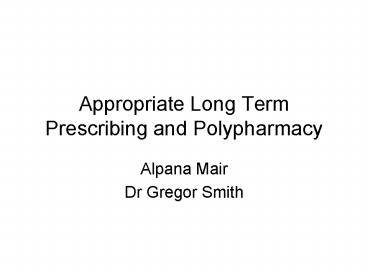Appropriate Long Term Prescribing and Polypharmacy - PowerPoint PPT Presentation
1 / 22
Title:
Appropriate Long Term Prescribing and Polypharmacy
Description:
Appropriate Long Term Prescribing and Polypharmacy Alpana Mair Dr Gregor Smith Some Background: The ageing population 62% projected rise in over 65s 2006-31 144% ... – PowerPoint PPT presentation
Number of Views:214
Avg rating:3.0/5.0
Title: Appropriate Long Term Prescribing and Polypharmacy
1
Appropriate Long Term Prescribing and Polypharmacy
- Alpana Mair
- Dr Gregor Smith
2
Some Background The ageing population
- 62 projected rise in over 65s 2006-31
- 144 projected rise in over 85s 2006-31
- Increased prevalence of LTC, esp COPD and
Diabetes - 24 projected rise in older people admitted as
emergencies by 2016 - Would require an extra 3.5 billion 2031
Audit Scotland
3
Multiple Morbidities
- Multiple conditions presence of 2 or more LTC
- Largely the norm but associated with poorer
outcomes - More people in Scotland with MM below 65 years
than above - Develops around 10 years earlier in deprived
areas - Associated with more medical errors
4
Multimorbidity in Scotland
Mercer, Guthrie, Wyke Scottish School of Primary
Care
5
Most people with any long term condition have
multiple conditions in Scotland
Mercer, Guthrie, Wyke Scottish School of Primary
Care
6
Mercer, Guthrie, Wyke Scottish School of Primary
Care
7
Pr. Bruce Guthrie, Dundee
8
Pr. Bruce Guthrie, Dundee
9
Contributory Factors
- AGE
- Non age factors that contribute to developing
polypharmacy include - Multiple morbidities
- Residence in long term care home
- Hospitalisation, esp repeat episodes of care
- Patient expectation
- GP attitude
- Consultation with several doctors
10
Polypharmacy associated dangers
- Adverse drug event
- Confusion
- Falls
- Interactions
- Drug drug Interaction
- Drug Disease Interaction
- Poor compliance and concordance
11
Drugs commonly associated with admissions due to
ADR
- NSAIDs 29.6
- Diuretics 27.3
- Warfarin 10.5
- ACE 7.7
- Antidepressants 7.1
- Beta blockers 6.8
- Opiates 6.0
- Digoxin 2.9
- Prednisolone 2.5
- Clopidogrel 2.4
12
High Risk Combinations
- NSAID plus any of
- ACE or ARB diuretic (triple whammy)
- eGFR lt60
- Diagnosis heart failure
- Warfarin
- Age gt75 without PPI
13
High Risk Combinations
- Warfarin Plus any of
- Another antiplatelet
- NSAID
- Macrolide
- Quinolone
- Metronidazole
- Azole antifungal
14
High Risk Combinations
- Heart Failure diagnosis plus any of
- Glitazone
- NSAID
- Tricyclic antidepressant
15
Drugs Poorly Tolerated in the Elderly
- Digoxin (doses higher than 250mcg)
- Antipsychotics
- Tricyclic antidepressants
- Benzodiazepines
- Anti cholinergics
- Phenothiazines
- Combination painkillers
16
Special considerations
- Orthostatic hypotension
- Shared side effects eg sedation, bleeding
- Diabetic treatment optimal HbA1c
- Antipsychotic medication
- Laxatives
- Shortened life expectancy
17
Drugs which can be associated with rapid
symptomatic decline if stopped
- ACE inhibitors in heart failure / LVSD
- Diuretics in heart failure
- Steroids
- Drugs for heart rate or rhythm control
- Anticonvulsants for epilepsy
- Antidepressant, antipsychotic, mood stabilisers
- amiodarone
- Drugs for managing Parkinsons Dis
- Disease modifying anti-rheumatic drugs
With caution
With specialist advice
18
CEL 36 November 2012
- Appropriateness of long term prescribing
- At medicines review
- On starting new medicines
- First iteration of National Guidance
- Aim to improve therapeutic care by reducing the
risk of adverse drug reactions associated with
polypharmacy
19
(No Transcript)
20
(No Transcript)
21
GMS Contract 2013 / 14
- Unique negotiated settlement in Scotland
- QPQOF High Risk Patients
- Anticipatory Care Plans
- Polypharmacy Review
- Multi-disciplinary approach
- SPARRA risk score 40-60
- 0.75 practice popn 1st yr, rising to 1.5 2nd yr
22
Questions?
- Dr Gregor Smith
- Alpana Mair































